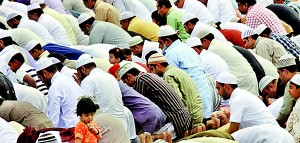A festival of charity after Ramadan purifies the heart
Eid-Ul-Fitr or the festival of charity is the culmination of the month-long fasting from dawn to dusk and the invocation of peace by prayers in the nights.

Muslims gather for festival prayers. (File Pic)
With the cry ‘Allahu Akbar….. ‘God is great’ reverberating in mosques, Muslims gather in the morning for festival prayers. Eid prayer is important for both men and women to attend. It is preferred to have it in an open area where the entire village could meet. In Sahih Al-Buhari vol 13 Book of the Two Festivals Chapter 02, Anas Bin Malik Hadith 528 says the Holy Prophet never went for Eid prayers unless he ate some dates in odd number. Another Hadity by Jabir Bin Abdullah says he took a different route while returning after prayers in order to meet and wish people. So it is essential that we take a meal before going to the mosques on this day, during which the family sits down to eat the first lunch after a lapse of one month.
Visiting relatives is another unique feature on this Eid day and the children love it. The Holy Prophet always encouraged his followers to make peace and establish justice and goodwill among mankind. It is noteworthy that the Quran enjoins peace even with enemies and it is the duty of every Muslim to bring about peace and eschew violence.
The Holy month of Ramadan is a month of peace and piety. All communities that existed before the Prophet’s time observed fasting in one form or another. The Holy Quran says, O Ye who believe, prescribed unto you is fasting as it was prescribed unto those before you that haply you may become God conscious – Chapter 2:183
There are two significant features in this Quranic verse. Fasting has been ordained on you so it is compulsory that you fast. The second part is that you may become God-fearing and do good deeds. Fasting does not mean avoiding food and drink. It is an act that purifies the Muslim spiritually. You must attain ‘Thakwa’ or God-consciousness. To achieve this, it becomes necessary that you engage in ‘Ibadath’, which means good deeds to win the love of Allah, the most compassionate and most loving.
The last ten days of Ramadan comprises a significant night. The Quran describes this night as ‘Lailathual Qadr’ or the night of power – a night which is better than a thousand months. It is on this day the first five verses of the Nobel Quran were revealed to the Prophet while he was meditating in a cave called Hira near Makkah.
The month of fasting is divided into three parts of 10 days each. The first part is Rahmah – during which devotees seek the mercy of Allah. The second part is “Magfirah” – during which the Muslims seek Allah’s forgiveness, and the last part, “Ihtikum-minan-naar” the deliverance from the hell.
The Holy Prophet used to put extra effort in his devotion during the last ten days of the month. He observed I’tikaf (retreat) by spending the last ten days in the mosque.
Another significant feature of this month is a historical event that took place on the 17th day. It was the battle of Badr where 313 Muslims led by the Holy Prophet faced an attacking army of three fold. The victory of Badr brought a new light and new vista to Islam.
Fasting has an immense impact on society, for Muslims irrespective of their status must observe fasting during the month and give as much from their wealth as possible in charity. Many Muslims make it a point to give Zakat (charity) during this month. Islam ordains one to given 2.5 percent of his wealth to the poor.
Zakat takes precedence over fasting in Islam. It is the third pillar of Islam. The five pillars are 1) Kalima – declaration of one’s faith in the one-ness of Allah; 2) prayers which the Muslims perform five times a day; 3) Zakat – Charity to the poor; 4) Fasting during the month of Ramadan and 5) Hajj (pilgrimage to the Holy mosque in Mecca at least once in life time is obligatory for those who can afford it). Zakat is compulsory for all Muslims. The Muslims are also commanded to give Sadaqathul Fitra – a special charity — at the end of the fasting month and before the festival prayers to ensure that every Muslim celebrates the festival and none is starved.
The Holy Quran provides a strong economic system under which Muslim countries ensure plenty of food, peace and harmony among people. Even today Muslim countries that apply the Quranic economic system do not fail in welfare schemes for the betterment of their people.
There are no excuses in the promotion of peace and the Holy Quran gives priority in the achievement of peace “And make not Allah’s (name) an excuse in your oath against doing good or acting rightly or making peace between human beings for Allah is He who heareth and knoweth of all things. Sura 2:224
May peace and harmony blessed by Almighty Allah be on our nation on this unique occasion. I wish my sisters and brothers a very Happy Eid.
(The writer is President, Council of Muslims of Sri Lanka Education For Progress Foundation)
Follow @timesonlinelk
comments powered by Disqus


